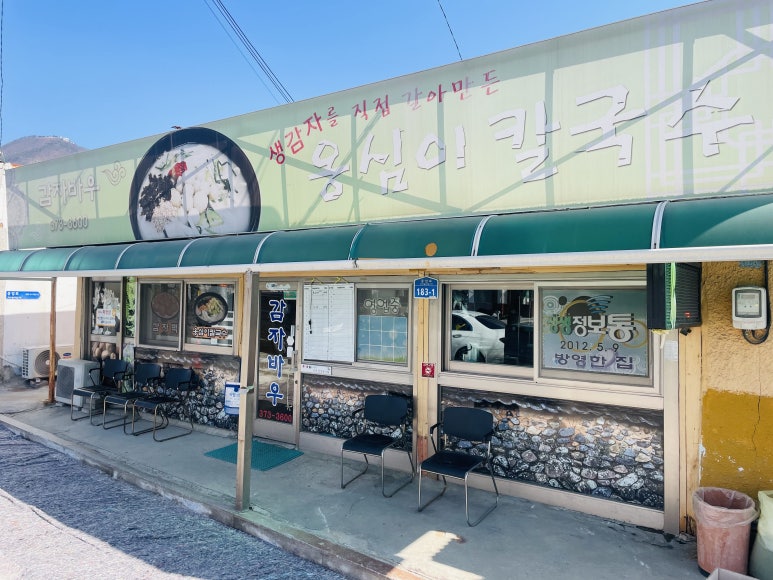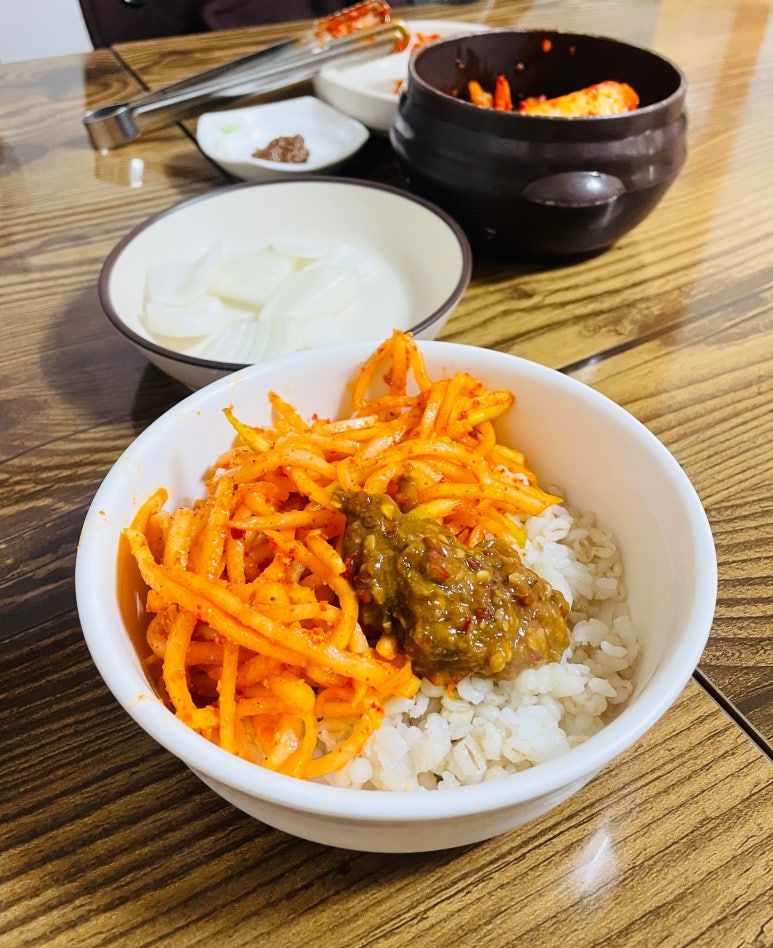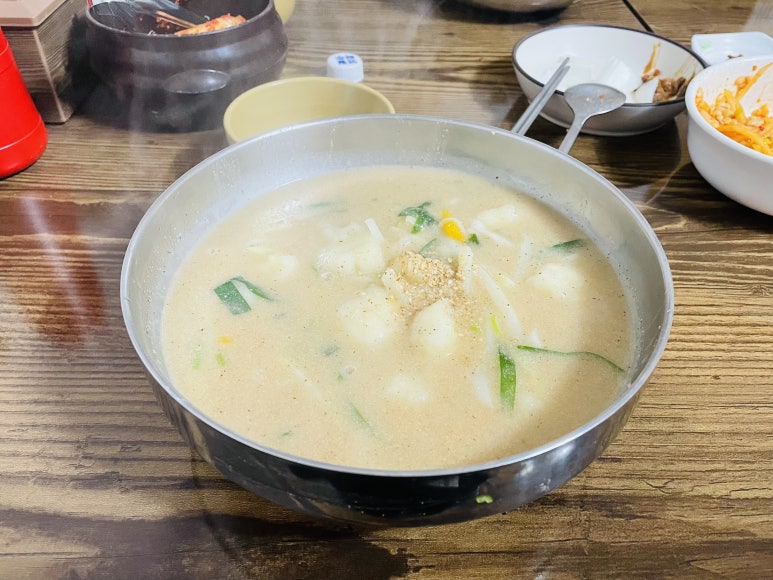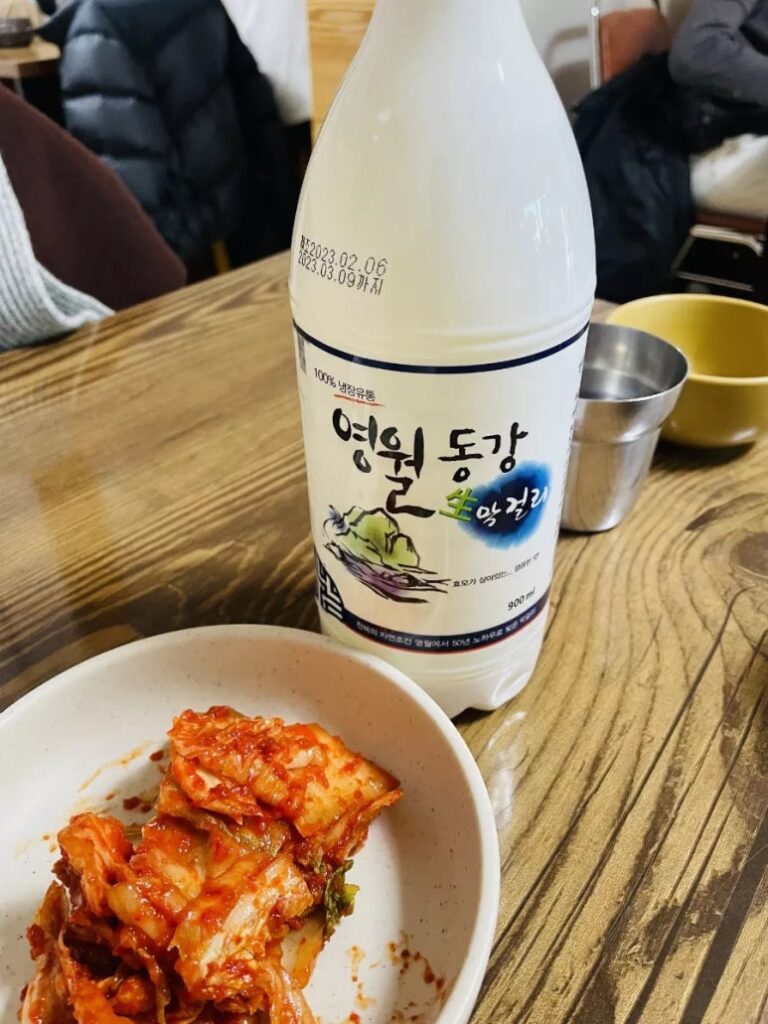There’s something uniquely satisfying about following a local’s recommendation—especially when it leads you to a meal that feels like home. During a recent trip to Yeongwol in Gangwon-do, I visited Gamjaba-u Ongshimi (감자바우 옹심이) at the suggestion of a colleague who grew up in the area. She told me it was a place that locals love and visitors remember. One bite into their signature potato dumplings, and I understood why. This wasn’t just a comforting Korean dish—it was a love letter to Gangwon’s humble but rich culinary tradition.

A Warm Welcome and a Familiar Recommendation
Gamjaba-u Ongshimi sits quietly along Yeongwol’s central street, near markets and residential alleys, with a small sign that reads “감자바우.” From the outside, it may look like a humble eatery, but as soon as I walked in, I was greeted with the warm buzz of local diners chatting over their steaming bowls of soup. It didn’t take long to feel like I’d made the right choice. The server handed me the menu with a smile, and I mentioned that a Yeongwol native had sent me. “Oh, you were recommended by a local? Then we’ll make sure you enjoy it even more!” she replied cheerfully.

A Strong Start with Barley Rice and Doenjang
Before my main dish even arrived, I was presented with one of the most delightful surprises of the meal: a complimentary bowl of barley rice and thick doenjang (soybean paste). This wasn’t just a small side dish—it was an invitation to eat slowly and appreciatively. The barley rice had a pleasant chew, and the doenjang was deeply fermented, earthy, and rich. I scooped a spoonful of doenjang onto the rice, added some cucumber slices and a bit of chili, and mixed it all together. It reminded me of countryside meals I’d had as a child—simple, grounding, and soul-warming.

The Star of the Show: Potato Ongshimi
Then came the main dish: a steaming bowl of potato ongshimi—Korea’s chewy potato dumplings served in a light broth. At first glance, it looked unassuming. But the moment I tasted the first dumpling, I was surprised by how intensely flavorful it was. The texture was soft yet elastic, a perfect balance between chewy and tender. The dumplings were made entirely from freshly grated potato starch, with no flour to dilute the taste. You could actually taste the potato—earthy, sweet, and clean. The broth was light but fragrant, subtly seasoned to support, not overshadow, the main ingredient. It was one of the rare moments where I found myself slowing down just to appreciate every bite.

A Perfect Pairing with Yeongwol’s Donggang Makgeolli
I decided to pair my meal with a bottle of Donggang Makgeolli, a local rice wine brewed in Yeongwol. Named after the scenic Donggang River, this makgeolli had a fresh, slightly sweet taste with a creamy finish that complemented the savory dishes beautifully. It cut through the richness of the doenjang rice and enhanced the clean finish of the ongshimi. Sipping the chilled makgeolli while watching the late morning light filter through the windows, I felt an overwhelming sense of calm. It wasn’t just a meal—it was a quiet celebration of local ingredients and slow food.
Atmosphere, Service, and What Makes It Special
Gamjaba-u Ongshimi isn’t fancy or polished—it’s welcoming, comfortable, and proudly local. Families, elderly regulars, and a few out-of-town visitors filled the tables. The service was friendly and sincere, and the woman running the floor made sure to check in with each table. “Do you have something to need more?” she asked me with a smile after noticing I was almost done with my soup. I was impressed by the balance between warmth and efficiency. Even during peak lunch hours, the flow of service was smooth, and guests were never rushed. You could tell this place runs on respect—for the food, for the customers, and for the tradition it represents.
A Tip for Visitors: Parking and Timing
One thing I appreciated was the small parking space behind the restaurant. It’s not immediately obvious from the street, but there’s a narrow alley that leads to a few spots reserved for guests. It made visiting much easier, especially since I had driven into town. That said, the restaurant has limited operating hours (11 a.m. – 2 p.m.), and ingredients often run out before closing time. My colleague had warned me to arrive early, and she was right—by 12:30, a small queue had already formed. If you’re planning a visit, aim for an early lunch, and call ahead if you’re coming on a weekend.
Gamjaba-u Ongshimi Menu, Prices, and Practical Details
If you’re traveling in Gangwon-do and looking for a true taste of local comfort food, this is a stop worth making. Here’s what you can expect on the menu:
Menu & Prices (KRW, as of 2025):
- Potato Ongshimi (감자옹심이): 9,000
- Ongshimi Kalguksu (옹심이칼국수): 8,000
- Kalguksu (칼국수): 7,000
- Homemade Frozen Potato Tteok (수제 감자떡, 30 pcs): 10,000
- Donggang Makgeolli (동강 막걸리): 5,000
- Other Alcohol (Soju, Beer, Rice Wine): 4,000 each
Restaurant Info:
- Name: Gamjaba-u Ongshimi (감자바우 옹심이)
- Address: 183-1 Jungang-ro, Yeongwol-eup, Yeongwol-gun, Gangwon-do, South Korea
- Phone: +82-507-1343-3602
- Opening Hours: 11:00 a.m. – 2:00 p.m. (Closed Mondays & Tuesdays)
- Parking: Behind the restaurant (limited space)
- Note: Ingredients may sell out early—arrive before 12:00 p.m. if possible
Gamjaba-u Ongshimi doesn’t try to be trendy, and it doesn’t need to. It offers something more enduring: flavors rooted in local tradition, served with care and respect. If you ever find yourself in Yeongwol, take the time to visit. It’s a meal that stays with you—not just in memory, but in feeling.
A Taste of Simplicity and Tradition at Sangdong Makguksu (상동막국수) in Yeongwol
